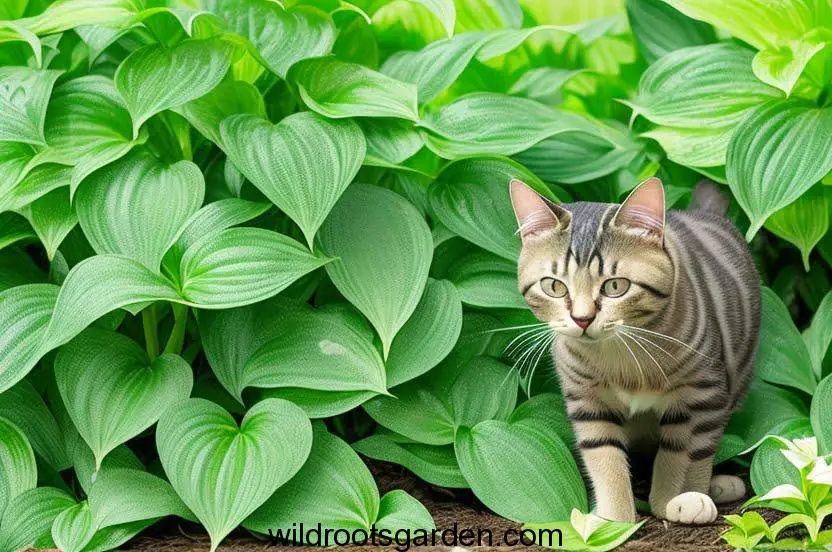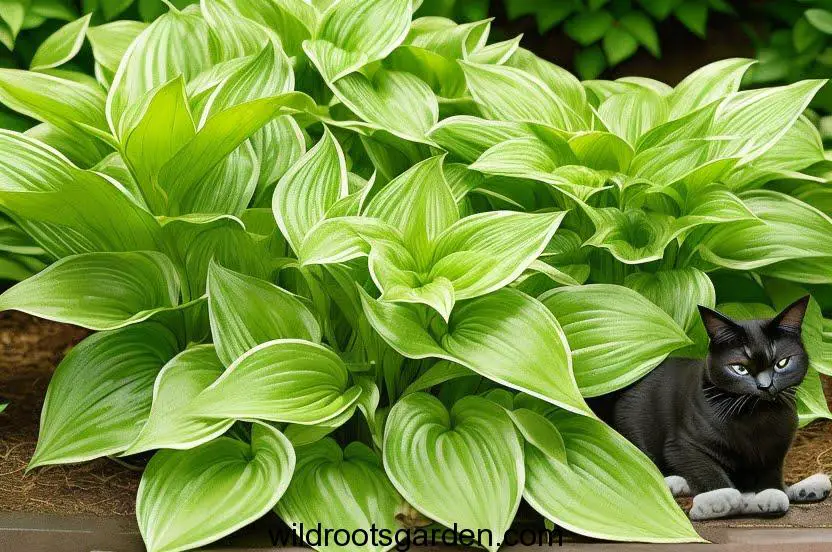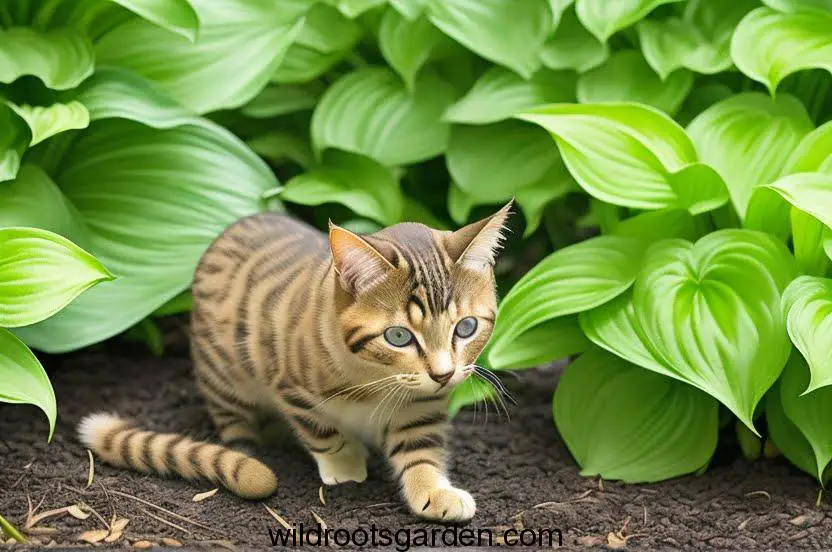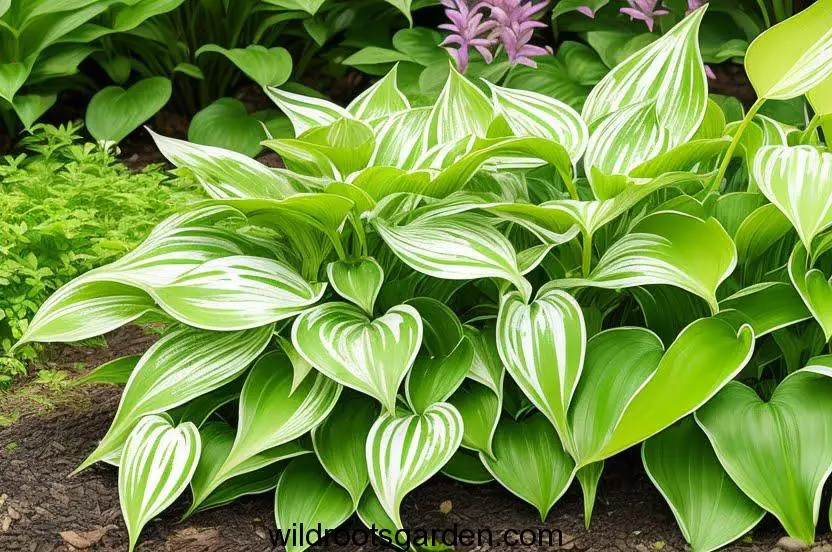Are Hostas Poisonous to Cats? Due to its lovely foliage and little maintenance needs, hostas are a favorite among garden aficionados. The question of whether hostas are safe to have around your cat may arise if you are a cat owner. This article will examine the question of whether hostas are poisonous to cats and give you important information about how to protect your cherished feline friend.

JUMP TO TOPIC
Understanding Hostas
Hostas are herbaceous perennial plants with enormous, colorful leaves. They are a flexible addition to any garden because of their wide range of sizes, colors, and shapes. These plants are frequently utilized as ground cover or decorative borders since they do well in shaded places.
Common Varieties of Hostas
Hostas come in many different types, each with unique traits. “Sum and Substance,” “Blue Angel,” “Frances Williams,” and “Golden Tiara” are a few well-known hosta cultivars. These varieties give visual interest to gardens and landscapes with their various leaf shapes, textures, and hues.
Potential Toxicity of Hostas to Cats
Are Hostas Poisonous to Cats? Hostas are typically thought to be safe for humans, but our feline friends are not so lucky. When consumed in large quantities, several chemicals found in hostas can be hazardous to cats. Although the precise causes of toxicity are yet unknown, it is thought that the glycosides and saponins found in hostas may be to blame.

Symptoms of Hosta Poisoning in Cats
Cats that consume large quantities of hosta leaves or blossoms may display a variety of poisoning symptoms. These signs can include drooling, vomiting, diarrhea, a lack of appetite, lethargy, and even breathing difficulties. It’s crucial to remember that the intensity of the symptoms might change based on the quantity consumed and the sensitivity of the particular cat.
Treatment for Hosta Poisoning
Are Hostas Poisonous to Cats? It’s critical to get your cat to the vet right away if you think it may have consumed hostas or the cat is displaying poisoning symptoms. To confirm the diagnosis, the veterinarian will undertake a thorough examination and perhaps some testing. The cat may need supportive treatment, vomiting inducement, activated charcoal administration to remove any lingering poisons and vigilant observation.

Prevention and Safety Measures
To ensure the safety of your cat, it’s essential to take preventive measures regarding hostas. Consider the following tips:
- Avoid planting hostas in areas accessible to your cat.
- Create physical barriers around hostas using fences or plant them in elevated containers.
- Train your cat to stay away from certain areas of the garden through positive reinforcement techniques.
- Provide alternative safe plants and grasses for your cat to nibble on.
Cat-Friendly Alternatives to Hostas
There are a number of cat-friendly substitutes to think about if you want to have lush greens in your garden but are worried about the potential toxicity of hostas. Catnip, cat grass, spider plants, and Boston ferns are a few risk-free possibilities. These plants can give your kitty friend a secure and entertaining habitat without endangering their health.

Conclusion
Hostas can be a lovely addition to your yard, but you should exercise caution because of their possible toxicity to cats. If cats consume significant doses of the hosta’s glycosides and saponins, it could be dangerous. It’s critical to get your cat to the vet right away if you think it may have consumed hostas or the cat is displaying poisoning symptoms.
Are Hostas Poisonous to Cats? Consider placing hostas in places your cat can’t get or erecting physical barriers around them to keep your feline buddy safe. Moreover, it’s a good idea to use positive reinforcement methods to teach your cat to stay away from specific garden areas. Also, giving your cat safe substitute plants and grasses to chew on might help divert their attention from potentially dangerous plants.
There are cat-friendly substitutes to take into consideration if you’re worried about the hostas’ possible risks. Safe options like catnip, cat grass, spider plants, and Boston ferns can give your cat a stimulating and interesting environment without endangering their health.
In conclusion, even though hostas might beautify your landscape, it’s crucial to put your cat’s safety first. You may design a garden that is both aesthetically pleasing and secure for your cherished feline companion by taking precautions, being aware of the potential symptoms of poisoning, and giving cat-friendly substitutes.
FAQs:
1. Are all varieties of hostas toxic to cats?
Yes, all varieties of hostas have the potential to be toxic to cats if ingested in large quantities. It’s best to take precautions and ensure that your cat cannot access these plants.
2. Can hosta poisoning in cats be fatal?
While hosta poisoning in cats is generally not fatal, it can cause significant discomfort and health issues. It’s important to seek veterinary attention if you suspect your cat has ingested hostas or is showing signs of poisoning.
3. How can I train my cat to stay away from the garden area with hostas?
You can train your cat to stay away from the garden area with hostas by using positive reinforcement techniques. Reward your cat with treats or praise when they avoid the area and redirect their attention to more appropriate areas or toys.
4. Can I still have hostas in my garden if I have a cat?
While it’s not recommended to have hostas in your garden if you have a cat, you can take precautions such as creating barriers or planting them in elevated containers to prevent your cat from accessing them.
5. What are some cat-friendly alternatives to hostas?
Catnip, cat grass, spider plants, and Boston ferns are safe alternatives to consider. These plants can provide a stimulating environment for your cat without posing a risk to their health.

